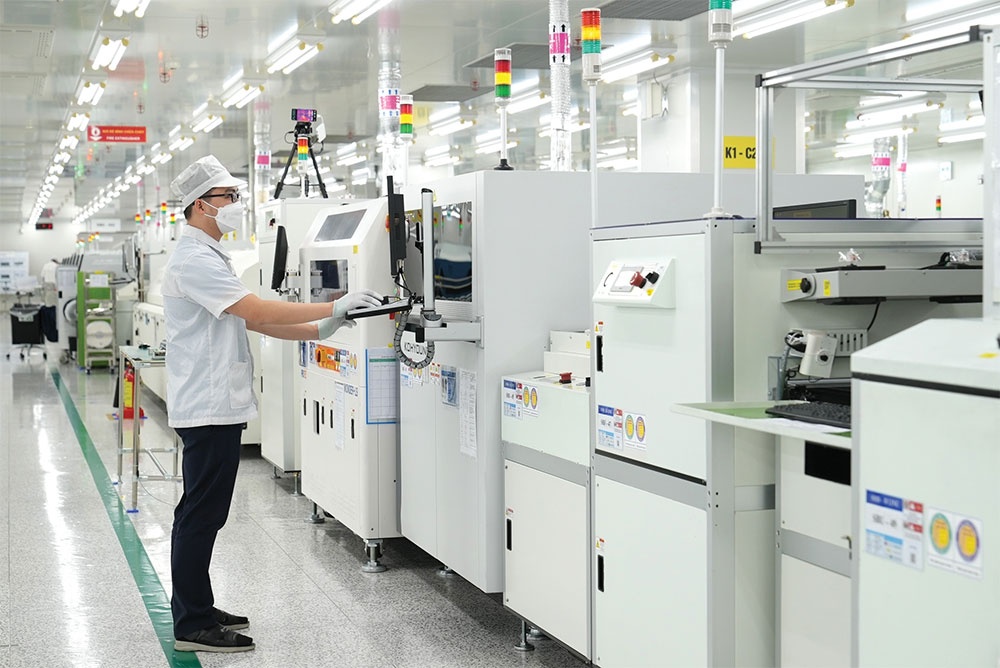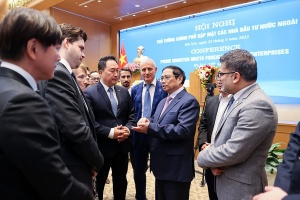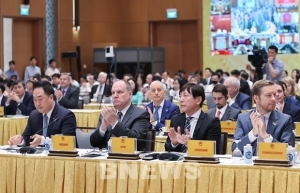New measures on tap for funding swell
At the largest conference ever to create stronger conditions for foreign investors in late April, Prime Minister Pham Minh Chinh emphasised the potential for overseas financiers to get involved in emerging fields such as digital transformation, green transition, circular economy, innovation, and climate change adaption.
 |
| New measures on tap for funding swell, illustration photo/ Photo Le Toan |
Regarding the global minimum tax (GMT) on corporates set to come into effect in 2024, the government has ordered reviews and will take measures to draw investment that is not contrary to the international commitments to ensure the harmonisation of interests of all relevant sides, and assure equitable treatment for enterprises.
The GMT was initiated by the Organisation for Economic Co-operation and Development (OECD), means enterprises with annual revenues of $827.18 million or more are eligible for a tax rate of 15 per cent. In 2024, most EU member states and Japan, South Korea, Singapore, Indonesia, China, and Australia will implement the GMT.
Currently, Vietnam has over 335 projects working in the domains of processing and manufacturing in economic and industrial zones, each with the registered investment capital of more than $100 million. The majority of them are funded by high-tech groups such as Samsung, Intel, LG, Bosch, Sharp, Panasonic, Foxconn, and Pegatron, all of which are likely to be subject to the GMT if it is implemented in Vietnam.
Nitin Kapoor, co-chair of the Vietnam Business Forum and president of AstraZeneca Vietnam, said that it was right for studies to be carried out on the impact of the GMT in the interests of investors and the business environment in Vietnam. “Thereby it can help devise practical, effective, and timely solutions to ensure investment and offset benefits for businesses if tax incentives are reduced or canceleld out,” he said.
Dominik Meichle, general director of Bosch Vietnam, expressed optimism that Vietnam will be able to develop a secure and predictable economic environment. “The anticipated implementation of the GMT in 2024 will likely have an impact on tax benefits for investors, as well as the effectiveness of investments and policy transparency,” Meichle said.
Meanwhile, according to Hong Sun, chairman of the Korean Chamber of Commerce in Vietnam, many South Korean enterprises already in this country, particularly those in high technology, finance, and energy, were considering increasing their investments and placing new funding if the business environment remained stable.
“To attract more investment, Vietnam needs to convince international investors that the country is making considerable progress in administrative changes and giving broader incentives,” he said.
According to the prime minister, the government would specifically support enterprises with land, sci-tech research expenses, administrative reform, social and worker housing, human resource training, and infrastructure development to promote greater foreign investment into the country.
Related to work permits and visas, Dao Ngoc Dung, Minister of Labour, Invalids, and Social Affairs, stated that the government is aiming to streamline related legislation and that foreign specialists and managers will be among the top priority in developing new regulations controlling work permit issuing.
PM Chinh also stressed the visa policy is being revised to provide the best conditions for overseas visitors.
Up to April 20, the country had 37,065 valid projects registered at nearly $445.9 billion; in which, the accumulated capital of foreign ventures is estimated at more than $279.8 billion.
| Greg Testerman - Chairman American Chamber of Commerce in Ho Chi Minh City and Danang
Investors continue to be concerned about uncertainty and complexity in Vietnam’s national energy policy, as well as the protracted regulatory approval process. We recommend that Vietnam expedite the approval process for energy projects. This would have an immediate, positive impact on Vietnam’s energy competitiveness, and on inflows of foreign capital. We particularly look forward to the eventual approval of Vietnam’s Power Development Plan VIII (PDP8), as significant international investment waits on the sidelines ahead of its approval. We recommend that Vietnam prioritise the development of more battery energy storage under the PDP8. Early approval of a pilot direct power purchase agreement (DPPA) model will also unlock billions in investment, especially from companies that have committed to renewable energy and carbon reduction. The free flow of data across borders, and access for Vietnamese users to global-standard services and data protection, are vital to sustained economic competitiveness. We look forward to reviewing the contents of the new decree on personal data protection over the coming weeks and appreciate the consultations with the Ministry of Public Security. In the healthcare sector, our members face lengthy approval processes for the import of healthcare products that Vietnam urgently requires. We applaud the National Assembly’s recent passage of a resolution giving automatic extensions for marketing authorisations of drugs that were set to expire at the beginning of this year. We recommend that a permanent solution be implemented to align Vietnam’s processes with global standards, including amendments to the pharma law. It still takes about eight years for a new drug to be licensed and included in the National Reimbursement Drug List, and so we recommend a new round of review that would contemplate frequent updating of that list. Our members also support the government’s efforts to build a green and circular economy, although there are still obstacles that impede the implementation of extended producer responsibility regulations, such as lack of recycling cost norms and recycling technology, among other factors. Gabor Fluit - Chairman European Chamber of Commerce in Vietnam
To stay on top of future energy needs, expediting the completion and implementation of PDP8 is crucial. In order to encourage renewable power production, Vietnam should implement DPPAs. Specifically, factories located in industrial parks should be allowed to participate in these agreements, as they can be a significant source of renewable energy production. Likewise, we suggest facilitating stronger conditions for production facilities that require renewable electricity to meet the EU’s compliance requirements. Vietnam’s transition to a circular economy is equally pivotal to achieving sustainable development goals and fostering economy-wide resource efficiency. We commend the Ministry of Natural Resources and Environment’s proposed roadmap and Vietnam’s efforts in implementing extended producer responsibility. However, we recommend introducing recycling costs that reward businesses for using materials with high-recycling values. Enterprises should also be allowed to turn in their recycling contributions for 2024 at the start of 2025, based on their production and import figures. On the same front, Vietnam stands to gain from increasing penalties for violating waste regulations and promoting the adoption of alternative materials like biodegradable plastics as a major waste reduction measure. Considering the vital importance of developing human resource quality, Vietnam should also continue to focus on being a magnet for high-quality talent and experienced management. Taking decisive action to attract and retain talent is like planting the seeds of prosperity for Vietnam’s future economic growth and development. This, of course, requires the resolution of the work permit bottleneck. The plans to simplify the application process for new or renewed permits will undoubtedly yield long-term effects that will benefit the country in many ways. In terms of tourism, this sector is a significant component of Vietnam’s growth, and we are excited to hear more about the government’s upcoming tourist visa reforms. For this, we strongly recommend extending visa-free entry to all European Union member states, opening the door to high-spending tourists and paving the way for increased investment in Vietnam’s future. As for healthcare, we are focused on improving access to pharmaceuticals and medical devices by optimising management processes and implementing global best practices. To achieve this, value-based financing and procurement policies should be revised through the Law on Pharma. We acknowledge the Ministry of Health’s efforts to approve marketing authorisation for outstanding Class C and D medical devices, as well as new submitted devices. This will absolutely contribute to improving access to high-quality healthcare at an affordable cost. The chamber endorses the government’s decision to extend tax payments and reduce VAT, which will support business recovery and stimulate consumer demand as a prime mover of growth. Regardless, Vietnam should also develop appropriate, competitive preferential policies to draw investment, especially given the impending GMT policy. In addition, harmonising administrative procedures and tax policies is crucial for driving trade growth under the EU–Vietnam Free Trade Agreement. In that vein, our recommendation is for the government to not use the special consumption tax (SCT) as a tool to counteract the advantages of eliminating import taxes. The government may also consider applying a hybrid SCT system on wine and spirits, but the tax should not be used for essential products such as milk and nutritional supplements. Moreover, we recommend exempting or reducing the SCT for environmentally friendly industrial products, such as electric vehicles. To maintain Vietnamese economic competitiveness and future-proof its administrative capacity, both the public and private sectors should continue to prioritise comprehensive digital transformation, especially in the implementation of administrative procedures to enhance the quality of life for people and businesses. This should include the digitalisation of services and the use of modern technologies such as cloud computing, automation, and AI. |
 | Foreign investors committed to Vietnam's sustainable development Foreign-invested enterprises in Vietnam are showing a strong commitment towards sustainable development, although a series of issues need to be tackled. |
 | Three foreign groups plan to pour 3.7 billion USD into Vietnam Three foreign groups unveiled their plans to pour 3.7 billion USD into Vietnam at the Prime Minister’s meeting with foreign investors in Hanoi on April 22, reported the Ministry of Planning and Investment. |
 | LPBank seeks strategic foreign investors LienVietPostBank, now known as LPBank, is embarking on a quest to attract foreign investors who share its vision and strategy, as it seeks to strengthen its market position and expand its horizons. |
What the stars mean:
★ Poor ★ ★ Promising ★★★ Good ★★★★ Very good ★★★★★ Exceptional
Related Contents
Latest News
More News
- Hermes joins Long Thanh cargo terminal development (February 04, 2026 | 15:59)
- SCG enhances production and distribution in Vietnam (February 04, 2026 | 08:00)
- UNIVACCO strengthens Asia expansion with Vietnam facility (February 03, 2026 | 08:00)
- Cai Mep Ha Port project wins approval with $1.95bn investment (February 02, 2026 | 16:17)
- Repositioning Vietnam in Asia’s manufacturing race (February 02, 2026 | 16:00)
- Manufacturing growth remains solid in early 2026 (February 02, 2026 | 15:28)
- Navigating venture capital trends across the continent (February 02, 2026 | 14:00)
- Motivations to achieve high growth (February 02, 2026 | 11:00)
- Capacity and regulations among British areas of expertise in IFCs (February 02, 2026 | 09:09)
- Transition underway in German investment across Vietnam (February 02, 2026 | 08:00)



 Tag:
Tag:

















 Mobile Version
Mobile Version